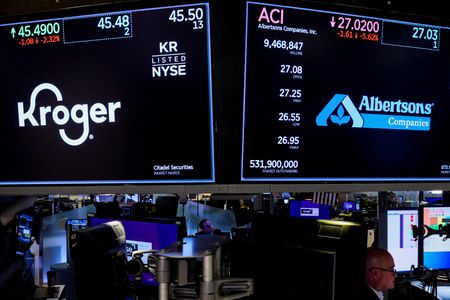By Diane Bartz
WASHINGTON (Reuters) – Skeptical lawmakers from across the political spectrum questioned executives at grocers Kroger Co and Albertsons Companies Inc on Tuesday about their planned $25 billion merger amid concerns the tie-up could boost already-high food prices.
Senator Amy Klobuchar, a Democrat and chair of the Senate Judiciary Committee’s antitrust subcommittee, said she worried the deal would mean a loss of competition in groceries, and potentially higher costs, at a time when inflation is already high.
“That’s why you’ve heard concern across the country about this transaction,” she said. The deal will be reviewed by the Federal Trade Commission to ensure it is legal under antitrust law.
Kroger Chief Executive Rodney McMullen sought to allay lawmakers’ worries about the planned purchase of a big rival, noting that the merged firms would still be much smaller than Walmart Inc, the country’s top grocer. “The combined company will remain at number four,” he said.
Stores under the Albertsons umbrella include Balducci’s, Haggen, Kings, Safeway, Star Market, Tom Thumb, United Supermarkets and Vons, among others. Kroger owns Baker’s, Dillons, Fred Meyer, King Soopers, Mariano’s, Pick’n Save and Ralphs.
Klobuchar and Senator Mike Lee, the top Republican on the panel, both pointed to Albertsons’ 2015 purchase of Safeway as a cautionary tale.
In that case, the companies were forced to sell 168 stores to ensure that competition would remain fierce and prices would not rise. The divestiture failed, and Albertsons bought back dozens of stores.
The companies, knowing this new tie-up would be controversial and that antitrust enforcement has become tougher, offered an aggressive plan aimed at resolving concerns when they announced the deal, which would bring nearly 5,000 stores under one corporate umbrella. The grocers said they expected to sell between 100 and 375 stores ideally to outside buyers but could also put them into a new company that would be owned by Albertsons’ shareholders. UBS has said it believes the plan will satisfy antitrust enforcers. This plan could force the FTC to not only prove in court that the transaction is illegal but that the proposed remedy is inadequate.
Kroger’s deal to buy Albertsons has also been criticized by unions and progressive groups, which have argued that the merger would exacerbate income inequality through job losses and eroding wages and have urged the government to block the deal.
The merger is being discussed at a time when the Biden administration is determined to bring down inflation. U.S. consumer prices rose less than expected in October, pushing the annual increase below 8% for the first time in eight months. Food prices increased 0.6%.
The companies have also been criticized for a plan to give Albertsons’ shareholders a $4 billion dividend payment. A Washington state court put that plan on hold with the next hearing set for Dec. 9. Separately, the attorneys general of Washington, D.C.; California and Illinois have also sued to stop that payment, arguing it would weaken the company’s ability to compete.
Senator Tom Cotton, a conservative Republican, criticized Kroger for the company’s aprons with a design that appeared to support gay pride. Two employees were fired for refusing to wear the apron.
Cotton referred to a dynamic in congressional hearings where conservative lawmakers are more likely to defend corporations, saying that companies that “discriminate” against conservatives “probably shouldn’t ask Republican senators to come and carry the water for them whenever our Democratic friends want to regulate them.”
(Reporting by Diane Bartz in Washington; Editing by Jonathan Oatis and Matthew Lewis)

